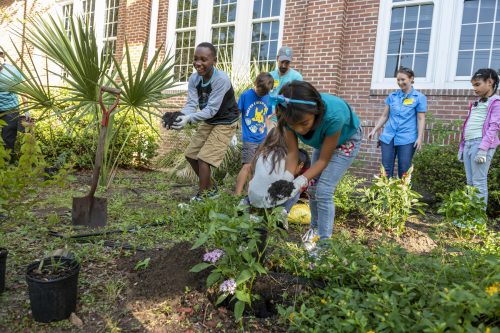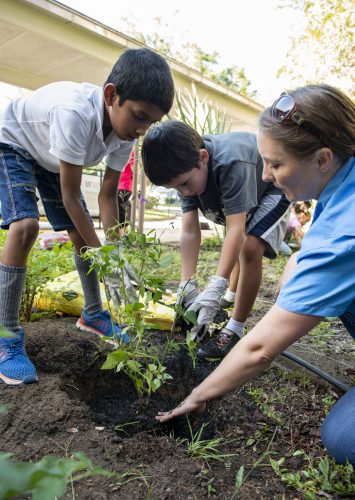GAINESVILLE, Fla. — Many young children today are disconnected from the natural world as controlled learning environments have placed a barrier between nature and students. But with support from Outback Steakhouse, the Florida Museum of Natural History is working to close the gap between urban students and nature by planting butterfly gardens in area schools.

Outback recently donated $5,000 to fund curriculum development centered on the museum’s ongoing project to install the gardens. The additional lessons seek to help teachers build stronger connections between students and the gardens and see more tangible results from their efforts.
“Students learning how to care for gardens can better understand why they’re so important,” said Elizabeth Watts, director of media and community relations for Bloomin’ Brands Inc., the parent company of Outback Steakhouse. “This may even open the door for sustainable agriculture awareness and many other important purposes gardens serve. Often times we are so busy in our lives that we don’t take time to stop and smell the roses. It’s good to remind our younger generation that we shouldn’t take nature — and all the beautiful things it offers — for granted.”

Since 2013, Florida Museum volunteers and employees, including scientists from the McGuire Center for Lepidoptera and Biodiversity, have helped teachers and students create and maintain gardens in nine Alachua County schools. The project helps teach students about the butterfly life cycle and the responsibilities involved in caring for a garden.
“The program gives hands-on exposure to the concepts and ideas children are learning about in class,” said Kara Schwartz, Florida Museum development coordinator. “Kids don’t get to go outside as much as they used to, so this is an opportunity to help them get their hands dirty while exposing them to nature.”
Museum employee and wildlife biologist Kimberly Tillman, who assists with the project, said school teachers often are just as excited as students about planting the gardens.
“Teachers crave the opportunities the garden brings,” Tillman said. “It gives them alternative learning spaces and provides hands-on learning experiences for students. If we’re able to give teachers a pre-made curriculum it makes it easier for them to get students outside.”
For more information on the museum’s school butterfly garden program, visit www.floridamuseum.ufl.edu/mcguire/outreach/butterfly-gardens-local-schools or call 352-273-2013.
-30-
Writer: Jessica Finkel, 352-273-2032, PRintern@flmnh.ufl.edu
Sources: Kara Schwartz, 352-273-2047, kschwartz@flmnh.ufl.edu; Elizabeth Watts, 813-830-4967, elizabethwatts@bloominbrands.com; Kimberly Tillman, kimberlywtillman@gmail.com
Media contact: Paul Ramey, 352-273-2054, pramey@flmnh.ufl.edu